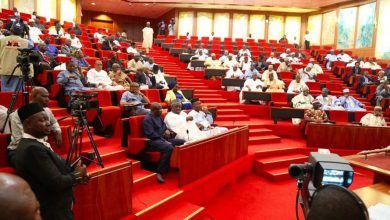
President Bola Tinubu has emphasized his administration’s dedication to advancing Nigeria’s digital economy as a pivotal strategy for youth empowerment and sustainable job creation.
Speaking on Monday in Abuja, the President made the commitment while receiving the report titled “Digital Economy, Youth Empowerment, and Sustainable Job Creation in Nigeria: Issues, Challenges, and Opportunities” from participants of the Senior Executive Course 46, National Institute for Policy and Strategic Studies (NIPSS), Kuru.
“Empowering the youth is at the heart of our administration’s agenda. This is a priority we must never lose sight of, and we need the collaboration of everyone to achieve it,” President Tinubu said, underlining his focus on using innovation and digital skills development as a means to enhance opportunities for young Nigerians.
The President expressed his appreciation for the report, acknowledging the in-depth work and recommendations provided by the NIPSS participants. “I have listened attentively to your recommendations, and I commend the thoroughness of your work. We will continue to engage the Institute as a crucial resource center and think tank,” Tinubu added, praising the efforts of the course participants in advancing the nation’s development agenda.
Key Recommendations for Digital Economy Growth
The NIPSS course participants presented a comprehensive eight-point recommendation, urging the federal government to expedite the passage of the Digital Economy and e-Governance Bill 2024 to facilitate the country’s digital transformation.
Among the key proposals was the call for state governments to waive right-of-way fees for the installation of telecommunications infrastructure, a measure designed to promote greater access to digital services across Nigeria.
Additionally, the participants suggested that President Tinubu issue an executive order mandating all ministries, departments, and agencies (MDAs) to migrate to the one go.ng portal, thereby improving the efficiency of government services and enhancing public access to information.
Another notable recommendation was the introduction of the Quintuple-Helix Model, which advocates for collaboration between government, the private sector, academia, civil society, and the media to accelerate the development of the digital economy, promote youth empowerment, and create sustainable jobs.
The participants also recommended bolstering long-term funding for the Three Million Technical Talent (3MTT) programme, a key initiative aimed at equipping young Nigerians with the technical skills needed to thrive in the digital economy.
Furthermore, they called for an expedited transition from Internet Protocol version 4 (IPv4) to version 6 (IPv6), a crucial step for expanding Nigeria’s digital infrastructure.
Additionally, the participants suggested the establishment of nationwide digital health innovation hubs and the creation of a preventive maintenance application for Nigeria’s automotive industry, underscoring the role of technology in improving key sectors of the economy.
A Call for Continued Collaboration
President Tinubu reiterated his commitment to ensuring that Nigeria’s digital economy becomes a cornerstone for youth empowerment and sustainable job creation.
He pledged that his administration would continue to work closely with institutions like NIPSS to ensure that the proposed reforms are successfully implemented.
“These recommendations are invaluable, and as we move forward, we will continue to engage with you to ensure the prosperity of Nigeria,” the President concluded, affirming his administration’s unwavering support for innovation-driven youth empowerment.
With a firm focus on the digital economy, President Tinubu’s government aims to create a more inclusive and future-ready Nigeria, where young people have access to the skills and opportunities they need to succeed in an increasingly digital world.





